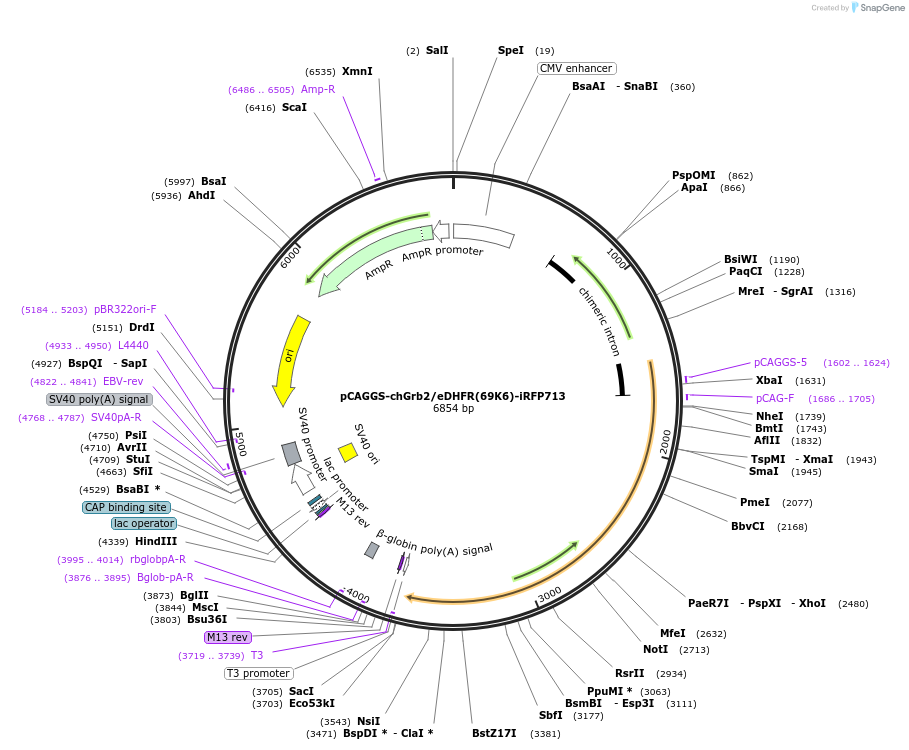pCAGGS-chGrb2/eDHFR(69K6)-iRFP713
(Plasmid
#178854)
-
PurposeMammalian expression of Grb2-eDHFR(69K6) chimera fused to iRFP713
-
Depositing Lab
-
Sequence Information
Ordering
| Item | Catalog # | Description | Quantity | Price (USD) | |
|---|---|---|---|---|---|
| Plasmid | 178854 | Standard format: Plasmid sent in bacteria as agar stab | 1 | $89 | |
Backbone
-
Vector backbonepCAGGS
-
Backbone manufacturerDr. Jun-ichi Miyazaki (Osaka University, Japan)
- Backbone size w/o insert (bp) 4880
-
Vector typeMammalian Expression
Growth in Bacteria
-
Bacterial Resistance(s)Ampicillin, 100 μg/mL
-
Growth Temperature37°C
-
Growth Strain(s)DH5alpha
-
Copy numberHigh Copy
Gene/Insert
-
Gene/Insert nameGrb2(1-59)-eDHFR(69K6)-Grb2(152-216)-iRFP713
-
SpeciesH. sapiens (human)
-
Insert Size (bp)1966
-
MutationGrb2: Y160E
-
Entrez GeneGRB2 (a.k.a. ASH, EGFRBP-GRB2, Grb3-3, MST084, MSTP084, NCKAP2)
- Promoter CAG
Cloning Information
- Cloning method Gibson Cloning
Resource Information
-
Supplemental Documents
Terms and Licenses
-
Academic/Nonprofit Terms
-
Industry Terms
- Not Available to Industry
Trademarks:
- Zeocin® is an InvivoGen trademark.
Depositor Comments
The chemical mDcTMP, to control protein translocation, can be obtained from Funakoshi Co., Ltd. https://www.funakoshi.co.jp/exports_contents/95015. Please visit https://www.biorxiv.org/content/10.1101/2021.03.16.435568v1 for bioRxiv preprint.
These plasmids were created by your colleagues. Please acknowledge the Principal Investigator, cite the article in which the plasmids were described, and include Addgene in the Materials and Methods of your future publications.
-
For your Materials & Methods section:
pCAGGS-chGrb2/eDHFR(69K6)-iRFP713 was a gift from Shinya Tsukiji (Addgene plasmid # 178854 ; http://n2t.net/addgene:178854 ; RRID:Addgene_178854) -
For your References section:
A chemogenetic platform for controlling plasma membrane signaling and synthetic signal oscillation. Suzuki S, Nakamura A, Hatano Y, Yoshikawa M, Yoshii T, Sawada S, Atsuta-Tsunoda K, Aoki K, Tsukiji S. Cell Chem Biol. 2022 Sep 15;29(9):1446-1464.e10. doi: 10.1016/j.chembiol.2022.06.005. Epub 2022 Jul 13. 10.1016/j.chembiol.2022.06.005 PubMed 35835118



